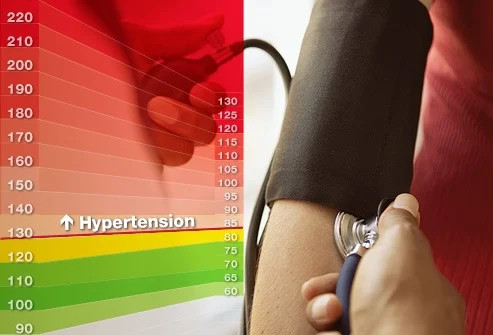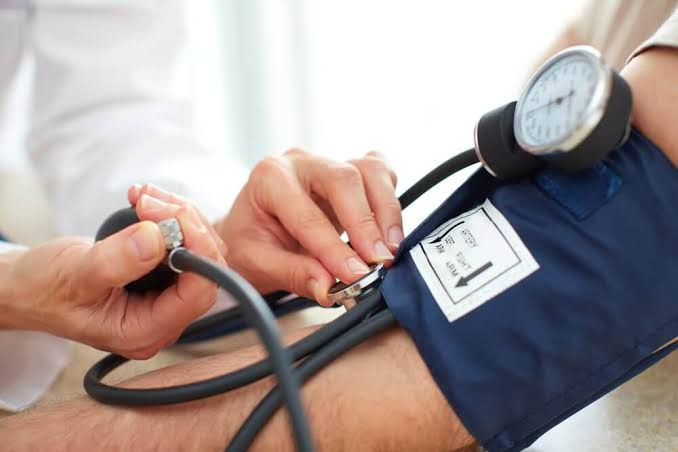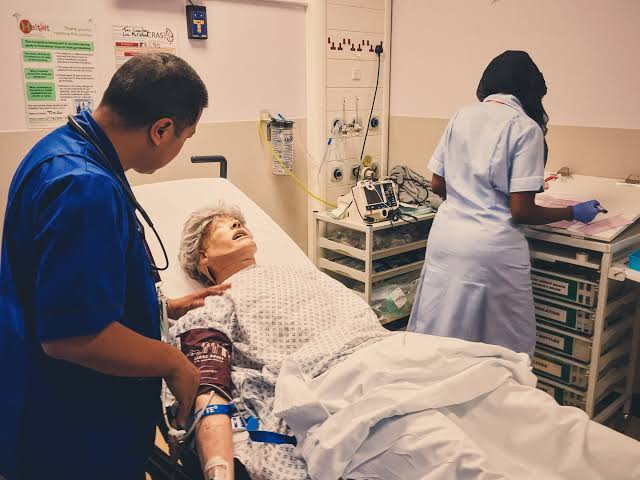Definition
Hypertension is commonly referred to as high blood pressure disease. Hypertension is a serious condition that can increase the risk of developing other diseases such as heart, kidney, and brain problems. Hypertension is the leading cause of death worldwide, with a ratio of 1 in 4 men and 1 in 5 women. About 1.13 million people worldwide suffer from hypertension. Meanwhile, 34.1% of Indonesia's population has hypertension.
Causes
Blood flows from the heart to the rest of the body, and each time the heart beats, blood is pumped into the blood vessels. Blood pressure is created by the force that blood exerts as it passes through the walls of blood vessels while the heart pumps. The higher the pressure, the harder the heart works.
Hypertension can occur due to various factors, ranging from genetic or hereditary, to environmental factors, such as lifestyle and underlying diseases. A study showed that 33-57% of high blood pressure can be genetically inherited.
Risk factor
Several risk factors for hypertension can be avoided, particularly those related to lifestyle, such as eating and diet habits, inactivity, smoking, alcohol consumption, and obesity are all modifiable risk factors.
However, some risk factors are inherent or unavoidable, such as genetics, having hypertensive parents or grandparents, being over the age of 65, and having other conditions such as diabetes or kidney disease. If you already have these risk factors, start living a healthy lifestyle as soon as possible to prevent developing hypertension.
Symptoms
Most people with hypertension are not aware of their symptoms. The most common symptoms include morning headaches, nosebleeds, irregular heartbeat, blurred vision, and ear ringing. Patients with severe cases frequently report aches, nausea, vomiting, absent-mindedness, palpitations, chest pain, and muscle tremors.
Diagnosis
Diagnosing hypertension can be done easily and painlessly by measuring the blood pressure. Normal blood pressure is below 130/85 mmHg. The test can be repeated over the next 3 years, but if you have risk factors, it should be repeated within a year.
If the blood pressure exceeds 140/90 mmHg, it indicates that the person has hypertension. If the blood pressure ranges from 130-140/85-90 mmHg, it is considered high-normal blood pressure.
Even if you have a blood pressure monitor at home, it is best to consult a doctor who can conduct a thorough examination as well as assess risk factors and associated medical conditions.
Before checking your blood pressure, to get a more accurate result, ensure the following conditions:
- Stay calm, and do not be anxious, agitated, or in pain. Rest is recommended 5 minutes before the examination
- Do not consume caffeine, cigarette, or engage in sports activities at least 30 minutes before the examination
- Do not take any medications containing phenylephrine or pseudoephedrine, such as cold medications or eye drops
- Do not hold back going to the toilet for urination or defecation
- Do not wear tight clothing, especially on the arms
- The examination is conducted in a quiet and comfortable room
- The patient is quiet, and not talking during the examination
Management
Changing your lifestyle to a healthier one is the most effective way to avoid hypertension and its complications. Here are the lifestyles that must be improved:
- If you smoke, stop smoking
- If you are obese with a body mass index of more than 25 kg/m2, lose weight gradually, 0.5-1 kg per week, with a target ideal weight, which is based on a body mass index of 18.5 - 22.9 kg/m2; and aim for a waist circumference of less than 90 cm in men and less than 80 cm in women
- Change your diet to one that is low in salt (less than 6 grams a day), low in saturated and trans fats, and increase consumption of vegetables, fresh fruits, nuts, low-fat dairy products, whole grains, fish, and unsaturated fatty acids (especially olive oil), and limit red meat intake
- Increase your moderate-intensity cardio or aerobic physical activity, such as walking, jogging, cycling, or swimming, to at least 30 minutes per day, 5-7 days per week
- Reduce the alcohol consumption
- Reduce stress and address the problem as it can worsen the condition of hypertension
Hypertension must be managed by preparing the patient mentally and psychologically, regularly checking blood pressure, checking in with the doctor, taking routine medication, and preventing complications of hypertension.
Complications
Changing your lifestyle to a healthier one is the most effective way to avoid hypertension and its complications. Here are the lifestyles that must be improved:
- If you smoke, stop smoking
- If you are obese with a body mass index of more than 25 kg/m2, lose weight gradually, 0.5-1 kg per week, with a target ideal weight, which is based on a body mass index of 18.5 - 22.9 kg/m2; and aim for a waist circumference of less than 90 cm in men and less than 80 cm in women
- Change your diet to one that is low in salt (less than 6 grams a day), low in saturated and trans fats, and increase consumption of vegetables, fresh fruits, nuts, low-fat dairy products, whole grains, fish, and unsaturated fatty acids (especially olive oil), and limit red meat intake
- Increase your moderate-intensity cardio or aerobic physical activity, such as walking, jogging, cycling, or swimming, to at least 30 minutes per day, 5-7 days per week
- Reduce the alcohol consumption
- Reduce stress and address the problem as it can worsen the condition of hypertension
Hypertension must be managed by preparing the patient mentally and psychologically, regularly checking blood pressure, checking in with the doctor, taking routine medication, and preventing complications of hypertension.
Prevention
If you are at high risk of developing hypertension, start living a healthier lifestyle. Here's how to keep your blood pressure within the normal range:
- If you smoke, start by quitting
- Eat healthy foods that are high in fiber, low in salt, and low in saturated fat. Eat more fruits and vegetables
- Increase your physical activity with moderate cardio or aerobic exercise, such as jogging or cycling; 5 times per week, for 150 minutes per week, with a minimum of 30 minutes per day
- Maintain your weight if it is ideal, with a body mass index of 18.5 - 22.9 kg/m2; and a waist circumference of less than 90 cm in men and less than 80 cm in women. If you are overweight, with a BMI of more than 25 kg/m2, you should lose some weight. Losing weight should be done gradually, 0.5-1 kg per week to reach your ideal weight
- Limit consumption of alcoholic beverages. Men should be limited to 2 glasses of alcohol a day, while women should be limited to 1 glass a day
- Get enough sleep, which in adults is about 7-8 hours a day, especially long sleep at night. This is because the regeneration of body cells in almost all organs is primarily done at night, so resting at this time will optimize organ function in the future
- Take care of your psychological health, as stress can increase the risk of hypertension
When to see a doctor?
If you have never been diagnosed with hypertension but are at high risk of developing it, see a doctor to be screened and evaluated further. If you have a blood pressure monitor at home, take your blood pressure regularly. If the result exceeds 140/90 mmHg, see a doctor for further evaluation.
If you do have hypertension, be aware of the following warning signs:
- Vomiting
- Shortness of breath
- Dizziness or lightheadedness
- Headache
- Excessive sweating without any exercise
- Heart palpitations
- Blurred vision
- Confusion
It could be caused by uncontrolled high blood pressure. If you notice any of the symptoms listed above and have a blood pressure meter, take the patient's blood pressure right away. If the patient's blood pressure exceeds 160/100, take them to the nearest hospital's emergency room immediately.
- dr Anita Larasati Priyono
WHO. Hypertension. https://www.who.int/health-topics/hypertension
Jermendy G, Horvath T, Littvay L, et al. Effect of genetic and environmental influences on cardiometabolic risk factors: a twin study. Cardiovasc Diabetol. 2011 November. 10:96.
Alexander MR, Yang EH. Hypertension. Medscape. 2019 February. https://emedicine.medscape.com/article/241381
Lukito AA, Harmeiwaty E, Situmorang TD, et al. Konsensus Penatalaksanaan Hipertensi 2021: Update Konsensus PERHI 2019. PERHI. Jakarta 2021.
Holland K, Marcin J. Everything You Need to Know About High Blood Pressure (Hypertension). Healthline. 2020 June. https://www.healthline.com/health/high-blood-pressure-hypertension
CDC. Prevent High Blood Pressure. 2020 February. https://www.cdc.gov/bloodpressure/prevent.htm
Beckerman J. When to Call Your Doctor About High Blood Pressure. WebMD. 2021 June. https://www.webmd.com/hypertension-high-blood-pressure/guide/hypertension-when-call-your-doctor











